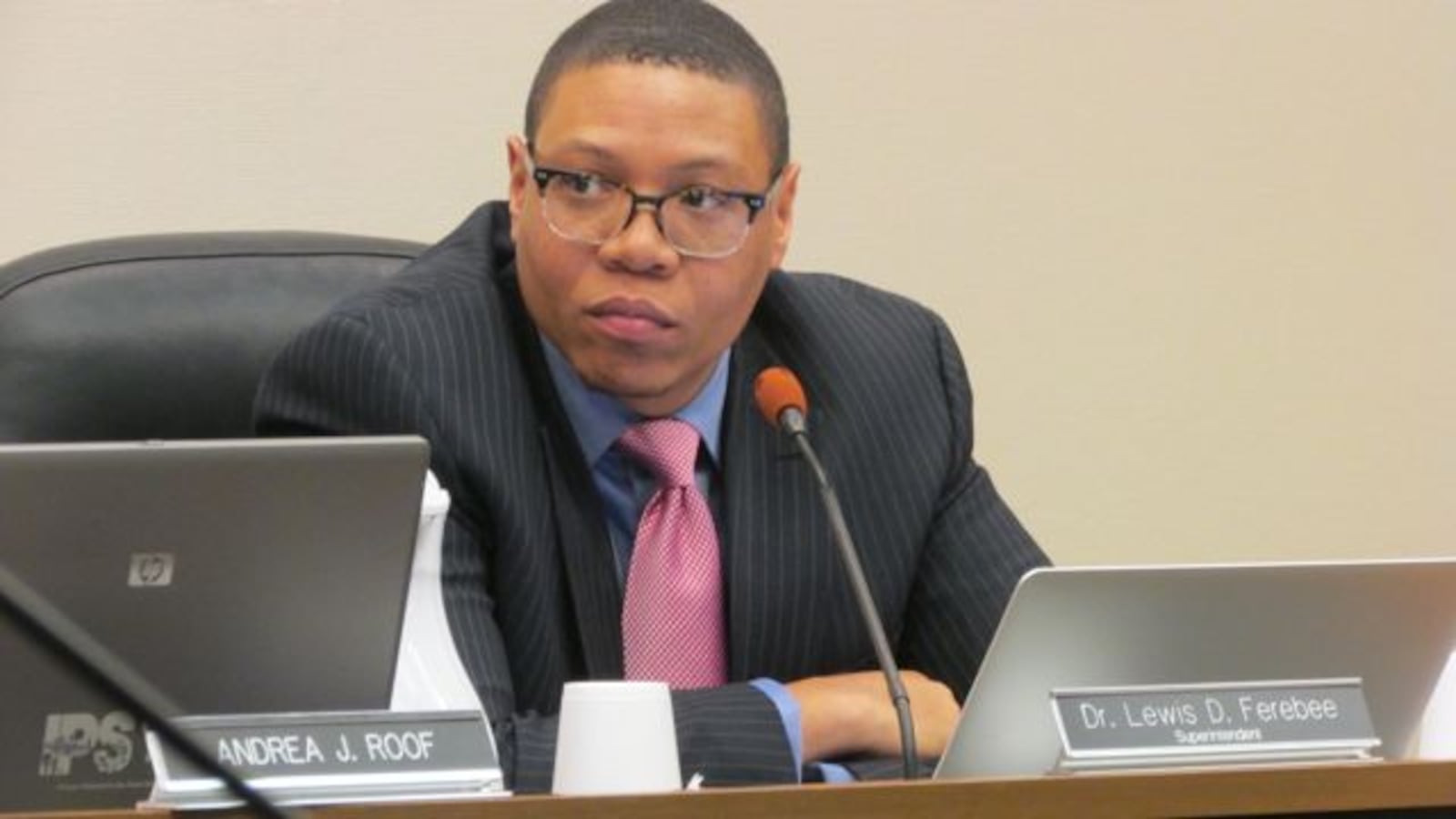Indianapolis Public Schools Superintendent Lewis Ferebee’s request to take back control of turnaround efforts at one of the district’s lowest-performing high schools won approval today, but the Indiana State Board of Education did not endorse a similar plan for two others.
Despite words of support for Ferebee’s work in his eight-month tenure, and by a narrow 6-4 vote, the board said IPS could serve as its own “lead partner” for George Washington High School but not for John Marshall and Broad Ripple high schools. For Marshall and Broad Ripple, outside companies will continue to get half the money from federal grants aimed at improving their test performance.
Some state board members said they couldn’t forget the district’s poor oversight of its lowest-rated schools in 2011, when the board first took action to try to improve George Washington and Broad Ripple high schools after both had earned six consecutive years of F grades for low test scores.
“The goal has always been to turn these schools back over to their own (school districts),” board member Cari Whicker said. “For some of us who were here when the takeovers happened, there was a lot of emotion involved.”
After six years of F grades, she said, someone else had to step in to assure the schools truly improved.
“We feel this responsibility to (students) to make sure it really happens,” Whicker said
All three schools risked state takeover, a severing of schools from district oversight in favor of outside management hired by the state board, but instead were assigned a lower level of state intervention.
Lead partners — a group of private companies — were hired by the state board to monitor and support turnaround efforts. The lead partner concept was strongly supported by Tony Bennett, Indiana’s former state superintendent who was defeated in a re-election bid by Glenda Ritz in 2012.
IPS was seeking to control nearly $900,000 total in school improvement grants to help lead turnaround efforts. Instead the state board let them fully control about $300,000 to oversee change efforts at George Washington and roughly half that amount — about $150,000 each — at John Marshall and Broad Ripple. Yet-to-be-named lead partner companies will get $150,000 for their work at each of those two schools.
Ferebee pushed hard for the board to reconsider his plan but ultimately had to accept the proposed compromise. He said he was unsure how working with the lead partners next school year will work.
“Obviously it’s not what we wanted, but we’ll start to shore up our plans for George Washington and move forward with implementation,” said Ferebee. “That’s a natural challenge that comes with leadership. I understand that we need to show some demonstrated results. We’d like to think we’ve done that in other schools and we’ll replicate that here.”
Ferebee asked the state last month to drop its costly contracts with outside companies like Scholastic Achievement Partners, Voyager Learning and The New Teacher Project, saying that his team had similar plans to improve the failing schools.
He argued the state should redirect the contract money to IPS, which could use it to build up its own monitoring and support efforts.
“I just don’t see how we can knowingly go into another school year and implement a model that we know doesn’t have that sustainability and does not build capacity,” Ferebee told the state board.
The state board’s executive director, Bob Guffin, was principal of IPS’s Harshman Middle School’s until he joined the Center for Education and Career Innovation last month. It was his recommendation to keep some lead partners on the job. Guffin said he had good experiences working with The New Teacher Project at Harshman.
Lead partners, Guffin said, have been deemed ineffective because they haven’t been given the “teeth” to require schools they work with make their recommended changes. Some principals have ignored their guidance, he said.
Ferebee countered that point, arguing a principal ultimately needs to take direction from the person who evaluates them, and that the lead partner consultants aren’t involved enough to understand all of the district’s decisions.
“It’s important for our leaders to have one voice,” Ferebee said. “Everybody struggles with having two masters.”
Some state board members said they wanted to support Ferebee’s vision without reinstating total district control.
“I’m struggling,” Board member Brad Oliver said. “I don’t want to discourage you, but I’m trying to balance that.”
Board member Tony Walker, who voted against the proposal, said it was inappropriate for the board to go forward with the plan, which he said violates at least the spirit of the state’s accountability law.
“For us to allow IPS to be its own lead partner without any demonstrated track record is irresponsible and a withdrawal of accountability,” Walker said. “We’ve tinkered with it too much. We’re not going to have good data as to its effectiveness if every year we mess with the lead partner program.”
Board member Gordon Hendry, who said he had the opportunity to tour an IPS school with Ferebee as his guide recently, said he voted no because he wanted more time to think about the proposal, not out of a lack of faith in Ferebee’s leadership.
“What I saw gives me a great deal of confidence,” Hendry said. “I wish you all the best.”


